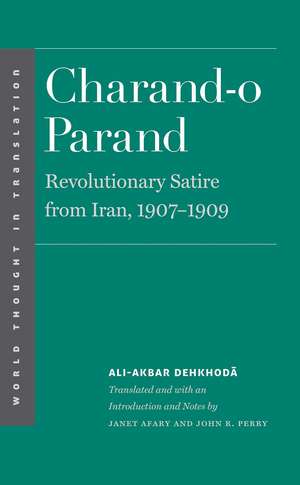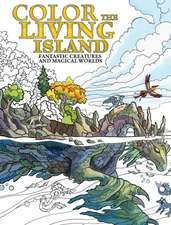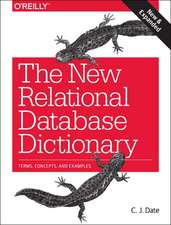Charand-o Parand: Revolutionary Satire from Iran, 1907-1909: World Thought in Translation
Autor Ali-Akbar Dehkhoda Traducere de Janet Afary, John R. Perryen Limba Engleză Hardback – 24 mai 2016
A classic of Modern Persian literature, Charand-o Parand (Stuff and Nonsense) is a work familiar to every literate Iranian. Originally a series of newspaper columns written by scholar and satirist Ali-Akbar Dehkhoda, the pieces poke fun at mullahs, the shah, and the old religious and political order during the Constitutional Revolution in Iran (1906–11). The essays were the Daily Show of their era. The columns were heatedly debated in the Iranian parliament, and the newspaper was shut down on several occasions for its criticism of the religious establishment. Translated by two distinguished scholars of Persian language and history, this volume makes Dehkhoda’s entertaining political observations available to English readers for the first time.
Preț: 563.20 lei
Preț vechi: 731.43 lei
-23% Nou
Puncte Express: 845
Preț estimativ în valută:
107.77€ • 112.82$ • 89.17£
107.77€ • 112.82$ • 89.17£
Carte tipărită la comandă
Livrare economică 07-21 aprilie
Preluare comenzi: 021 569.72.76
Specificații
ISBN-13: 9780300197990
ISBN-10: 0300197993
Pagini: 352
Ilustrații: 2 b-w illus.
Dimensiuni: 140 x 210 x 27 mm
Greutate: 0.59 kg
Editura: Yale University Press
Colecția Yale University Press
Seria World Thought in Translation
ISBN-10: 0300197993
Pagini: 352
Ilustrații: 2 b-w illus.
Dimensiuni: 140 x 210 x 27 mm
Greutate: 0.59 kg
Editura: Yale University Press
Colecția Yale University Press
Seria World Thought in Translation
Notă biografică
Ali-Akbar Dehkhoda (1879–1956) was a prominent linguist whose greatest achievement was an authoritative Persian dictionary.
Descriere
A classic of Modern Persian literature, Charand-o Parand (Stuff and Nonsense) is a work familiar to every literate Iranian. Originally a series of newspaper columns written by scholar and satirist Ali-Akbar Dehkhoda, the pieces poke fun at mullahs, the shah, and the old religious and political order during the Constitutional Revolution in Iran (1906–11). The essays were the Daily Show of their era. The columns were heatedly debated in the Iranian parliament, and the newspaper was shut down on several occasions for its criticism of the religious establishment. Translated by two distinguished scholars of Persian language and history, this volume makes Dehkhoda’s entertaining political observations available to English readers for the first time.















